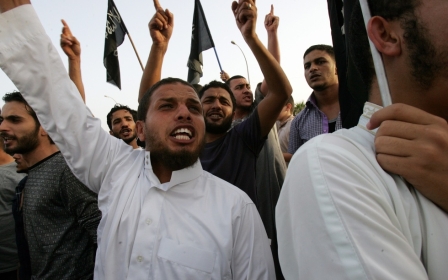Libya's Haftar vows 'near' victory as Benghazi clashes kill 20

Fierce clashes raged in Benghazi on Friday, leaving more than 20 people dead, on the third day of an offensive by pro-government forces to capture Libya's second city.
An AFP correspondent said the latest fighting was the most violent since forces of former general Khalifa Haftar – who vowed a 'near' victory - launched the assault on Wednesday with the backing of army units and civilians who have taken up arms.
Benghazi Medical Centre said the 18 dead were mostly soldiers and their civilian supporters in the central district of Al-Majouri.
There was no word on casualties on the side of the Islamists, who rarely announce their losses.
Another four people died on Friday night after a suicide bomber blew up his car at a checkpoint in the central Benghazi district of Boudhima. The suicide bomber was among the dead, Benghazi Medical Centre said.
In a statement on a pro-Haftar television station, Al-Karama, the retired general said he was "satisfied with the results of the battle for Benghazi" and vowed that "victory is near".
At least 52 people have been killed in the three days of Haftar's military offensive, according to hospital figures.
Al-Majouri is home to Mohamed al-Zehawi, leader of the Ansar al-Sharia group.
Street fighting
Residents said the two sides were using weapons of all calibres in street fighting in a densely-populated district.
Warplanes used by the pro-Haftar camp have also bombarded several sites in the city, Eyewitnesses told Anadolu Agency.
The Libyan Red Crescent called on its Facebook page for a ceasefire, "even for one hour," to allow families to flee the combat zone.
Islamist fighters have seized control of large parts of turmoil-gripped Libya since a 2011 uprising against long-time leader Moamer Gaddafi.
The army has this time publicly thrown its weight behind Haftar, who launched a first, unsuccessful, campaign against the Islamists in Benghazi in May, dubbing it "Operation Dignity".
In May, the authorities had accused the former Gaddafi-era general -- who spent years in exile before returning to join the 2011 revolution -- of trying to mount a coup.
The sharp political divisions in Libya have yielded two rival seats of government, each of which has its own institutions.
Two assemblies currently vie for legislative authority: a recently-elected House of Representatives, which convenes in the eastern city of Tobruk; and the General National Congress, which – even though its mandate ended in August – continues to convene in capital Tripoli.
The two parliaments support two different governments respectively headquartered in the two cities.
Stay informed with MEE's newsletters
Sign up to get the latest alerts, insights and analysis, starting with Turkey Unpacked
Middle East Eye delivers independent and unrivalled coverage and analysis of the Middle East, North Africa and beyond. To learn more about republishing this content and the associated fees, please fill out this form. More about MEE can be found here.




